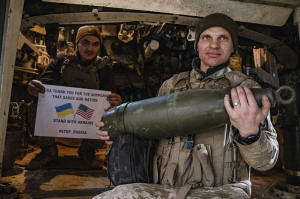Russian missiles kill 5 in Ukraine as Kremlin mulls ceasefire prospects
[March 12, 2025]
By SAMYA KULLAB
KYIV, Ukraine (AP) — Russian ballistic missiles killed at least five
civilians in Ukraine, officials said Wednesday, a day after the Trump
administration lifted its suspension of military aid for Kyiv’s fight
against Russia’s invasion and Ukrainian officials signaled they were
open to a 30-day ceasefire.
The Kremlin didn't comment on the agreement announced Tuesday between
the U.S. and Ukraine on the provision of further military support,
including intelligence sharing, and the possibility of a ceasefire that
Washington backs.
Kremlin spokesperson Dmitry Peskov said Wednesday that it's important
not to “get ahead” of the question of responding to the 30-day ceasefire
proposal. He told reporters that Moscow is awaiting “detailed
information” about it from the U.S. and suggested Russia must get that
before it can take a position.
The Russian missiles killed four Syrian men between the ages of 18 and
24 on a ship docked at the southern port of Odesa late Tuesday, where it
was loading Ukrainian wheat for Algeria, Infrastructure Minister Oleksii
Kuleba said.
Another missile killed a woman in Kryvih Rih, President Volodymyr
Zelenskyy’s hometown in central Ukraine, authorities said.
The American help is vital for Ukraine’s shorthanded and weary army,
which is having a tough time keeping Russia’s bigger military force at
bay. But for Moscow, more American aid spells potentially more
difficulty in achieving its war aims and likely will be a tough sell in
Moscow for Washington’s peace efforts.

Arms deliveries to Ukraine have already resumed through a Polish
logistics center, the foreign ministers of Ukraine and Poland announced
Wednesday.
The deliveries go through a NATO and U.S. hub in the eastern Polish city
of Rzeszow that’s has been used to ferry Western weapons into
neighboring Ukraine about 70 kilometers (45 miles) away.
U.S. President Donald Trump wants to end the three-year war and
pressured Zelenskyy to enter talks. The suspension of U.S. assistance
came days after Zelenskyy and Trump argued about the conflict in a tense
White House meeting.
U.S. Secretary of State Marco Rubio, who led the American delegation to
Tuesday's talks in Saudi Arabia, said that Washington would present the
ceasefire offer to the Kremlin, which has so far opposed anything short
of a permanent end to the conflict and hasn't accepted any concessions.
“We’re going to tell (the Russians) this is what’s on the table. Ukraine
is ready to stop shooting and start talking. And now it’ll be up to them
to say yes or no,” Rubio told reporters after the talks. “If they say
no, then we’ll unfortunately know what the impediment is to peace here.”

[to top of second column]
|

Soldiers of Ukraine's 5th brigade hold a poster thanking for the US
for support during a flashmob at the front line near Toretsk,
Donetsk region, Ukraine, Tuesday, March 11, 2025. (AP Photo/Roman
Chop)

Trump’s special envoy, Steve Witkoff, is expected to travel this
week to Moscow, where he could meet with Russian President Vladimir
Putin, according to a person familiar with the matter but not
authorized to comment publicly. The person cautioned that scheduling
could change.
French President Emmanuel Macron welcome the U.S.-Ukraine agreement
and said on X that “the ball is now clearly in Russia’s court.”
Russian officials are wary about the U.S.-Ukraine talks
Russian lawmakers signaled wariness about the prospect of a
ceasefire.
“Russia is advancing (on the battlefield), so it will be different
with Russia,” senior Russian senator Konstantin Kosachev noted in a
post on the messaging app Telegram.
“Any agreements (with the understanding of the need for compromise)
should be on our terms, not American,” Kosachev wrote.
Lawmaker Mikhail Sheremet told the state news agency Tass that
“Russia is not interested in continuing” the war but at the same
time Moscow “will not tolerate begin strung along.”
The outcome of the Saudi Arabia talks “puts the ball back in
Russia’s court and places the onus on Washington to persuade Moscow
to accept and implement the ceasefire,” John Hardie, a defense
analyst and deputy director of the Russia Program at the Foundation
for Defense of Democracies, a Washington-based research institute.
“Moscow will present itself as cooperative, but may push for
agreement on basic principles for a final peace deal before agreeing
to a ceasefire,” he said.
“Russia may also insist on barring Western military aid to Ukraine
during the ceasefire and on Ukraine holding elections ahead of a
long-term peace agreement.”

Russia’s foreign intelligence service, known as the SVR, reported
Wednesday morning that the service’s chief, Sergei Naryshkin, spoke
on the phone with CIA Director John Ratcliffe on Tuesday.
The two discussed cooperation “in areas of common interest and the
resolution of crisis situations,” according to a statement by the
SVR.
___
Stefanie Dazio in Berlin, and Sylvie Corbet in Paris, contributed to
this report.
All contents © copyright 2025 Associated Press. All rights reserved |